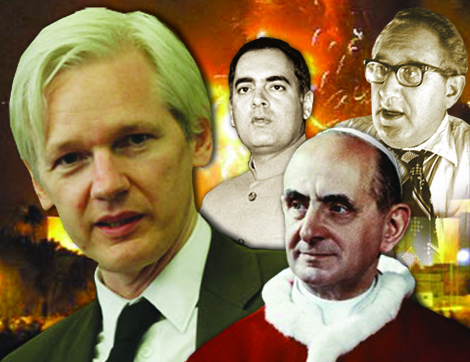
• Diplomatic cables of the 1970s reveal facts U.S., Israel, India, others would prefer remain hidden
By Keith Johnson
The inner workings of the United States State Department during the Kissinger era are under renewed public scrutiny thanks to whistle-blowing website WikiLeaks, which recently released more than 1.7M diplomatic cables from 1973 to 1976, a portion of which has been dubbed the “Kissinger Cables.”
Although the U.S. government has already declassified many of the documents, they’ve been sitting for decades in virtual obscurity at the National Archives in Washington, D.C. In what can only be described as a remarkable achievement, WikiLeaks obtained the massive collection of files and reverse engineered them in a way that makes it easy to cross reference material according to names, places, dates and events. The end result is a massive database that allows researchers to glean fresh insights on America’s foreign policy during this volatile era of uncertainty.
For instance, correspondence sent from the U.S. Embassy in Saudi Arabia suggests that American diplomats were far more forthcoming in their evaluations of Middle East tensions than they are today. In a January 9, 1975 cable, Israel is accused of being the stubborn partner in peace negotiations by concluding that Arabs will never guarantee their security and that future wars are inevitable.
According to the cable: “Israeli pessimism seems largely if not entirely unwarranted. It seems based on an extraordinary lack of understanding of what happened in the Arab world in the last year and a half. Rather than girding their loins for the fifth, sixth, seventh Israeli-Arab wars, the Israelis might examine more carefully than they seem to have done so far [and accept] the alternative of a peaceful accommodation with the Arabs.”
The cable goes on to say: “If Israel were prepared to accept the Arab proposition and return to 1967 borders, and simultaneously were assured that this withdrawal would be expected only if there were guarantees of its security, we have no doubt that the Arabs—at least those here—would be willing to give them almost anything they could ask.”
In another cable, former Secretary of State Henry Kissinger is shown to have had particular contempt for transparency and the rule of law. After Turkey invaded the island of Cyprus in 1974, Kissinger met with Turkish foreign minister Melih Esenbel and discussed ways the U.S. might be able to supply Turkey with arms and other foreign aid.
“The Europeans should find ways to meet quick needs; for example, the air force needs spare parts,” Esenbel suggested. “For other items that they can’t find in the stocks, maybe you could make a deal with the Dutch or others to send it here.”
“That is illegal,” replied William Macomber, former U.S. ambassador to Turkey.
“Before the Freedom of Information Act, I used to say at meetings, ‘The illegal we do immediately; the unconstitutional takes a little longer’,” said Kissinger as some in the room broke out in laughter. “But since the Freedom of Information Act, I’m afraid to say things like that. We’ll make a major effort.”
The Kissinger Cables contain at least one—and in most cases several—cables pertaining to almost every significant player, organization and event that occurred on the world stage between 1973 and 1976.
One intriguing diplomatic cable suggests that India’s assassinated Prime Minister Rajiv Gandhi was the middleman for a Swedish company looking to sell fighter jets to the Indian air force during the 1970s. The cable cites a Swedish Embassy official claiming that Gandhi was the “main negotiator” for Swedish aircraft company Saab-Scania, and that he received kickbacks because his mother, Indira Gandhi, was the sitting prime minister at the time. The allegation has since sparked considerable uproar in India.
One of the more bizarre revelations comes from a cable written by U.S. diplomat William Sullivan, who describes a 1973 birthday celebration for former Philippine President Ferdinand Marcos that included a “drag show.”
According to the cable: “This whole affair was a saccharine suffusion of sycophancy, which reminded me unhappily of the heydays of Sukarno and Sihanouk. Although Imelda was responsible, the president seemed to enjoy it and appeared unaware of the negative vibrations among his courtiers, especially the senior military upon whom so much of his future programs will depend.”
Pope Paul VI and Vatican Archbishop Giovanni Benelli are said to have dismissed much of the claims about the murder and incarceration of former Chilean President Augusto Pinochet’s political opponents as “communist propaganda.” According to an October 18, 1973 cable, “Even moderate and conservative circles seem quite disposed to believe grossest lies about Chilean Junta’s excesses. Realizing that Allende’s fall was one of greatest setbacks to communist cause, Benelli said, leftists forces have greatly cut losses by convincing world that Allende’s fall due exclusively to fascist and external forces rather than to shortcomings of Allende’s own policies as is rightly case. Benelli expressed fears that this successful communist propaganda campaign is only portent of how communists can influence free world media in future.”
Of course all of this is only the tip of the iceberg. More than one billion words are contained in the WikiLeaks data dump, and there will be likely even more startling revelations as journalists have an opportunity to sort through the voluminous information over the course of the next several days, months and years ahead.
Keith Johnson in an investigative journalist and host of the Revolt of the Plebs radio program.


